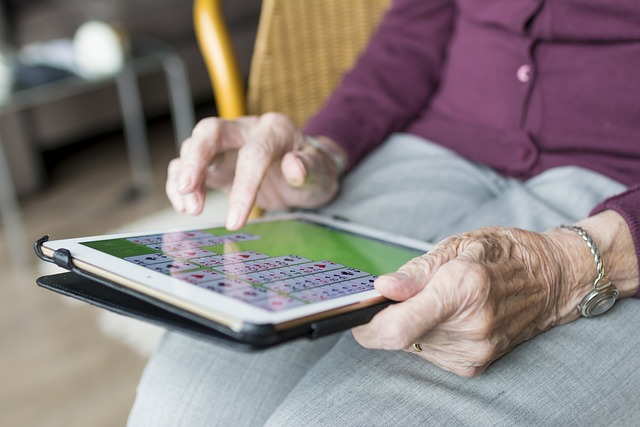Elderly companion services are transforming home healthcare for seniors who prefer to age in place by offering a tailored blend of social interaction, personal care, and daily living support, all designed to maintain their mental and physical health. These services are backed by trained caregivers who assist with activities of daily living, offer medication reminders, and ensure safety through regular monitoring and emergency response protocols. Advanced technologies such as wearable devices and remote monitoring systems play a crucial role in these services, promoting autonomy while ensuring prompt medical attention. With the integration of smart sensors, artificial intelligence, and telehealth options, elderly companion services are becoming more dynamic, offering personalized care that adapts to each individual's evolving needs. This tech-empowered approach not only supports independence but also enhances quality of life, allowing seniors to age in place with a heightened sense of security and dignity. Family members gain confidence knowing their loved ones are well looked after, and the overall well-being of elderly individuals is significantly improved through these comprehensive services.
In-home health monitoring assistance has become increasingly vital, especially with the aging population seeking comfort and care within familiar surroundings. This article delves into the transformative role of elderly companion services, highlighting how they are leveraging technological advancements to offer personalized care that significantly improves health outcomes and enhances quality of life for seniors. We will explore the multifaceted benefits of these services, from their ability to provide constant vigilance to their contribution in fostering a sense of independence and companionship among the elderly. Join us as we navigate the intersection of innovation and eldercare, emphasizing how companion services are redefining the standard for home health monitoring assistance.
- Understanding the Role of Elderly Companion Services in In-Home Health Monitoring Assistance
- Technological Advancements Enhancing Elderly Companion Services
- The Impact of Personalized Elderly Companion Care on Health Outcomes and Quality of Life
Understanding the Role of Elderly Companion Services in In-Home Health Monitoring Assistance

Elderly companion services play a pivotal role in the realm of in-home health monitoring assistance, offering a blend of social interaction and continuous care for seniors who wish to maintain their independence while residing in familiar surroundings. These services are designed to complement the medical aspects of home healthcare by providing companionship, which is just as crucial for an elderly person’s well-being as are medical interventions. Trained caregivers from companion services can assist with daily activities, medication reminders, and provide a safety net through regular monitoring and emergency response protocols. This allows family members to have peace of mind knowing their loved ones are not only receiving medical oversight but also the emotional support that is integral to maintaining mental health and quality of life. With advanced technologies integrated into these services, such as wearable devices and remote monitoring systems, elderly individuals can enjoy a higher degree of autonomy while still benefiting from the proactive attention that ensures their health needs are met promptly. These companion services are tailored to meet the unique requirements of each senior, fostering a personalized and supportive environment that encourages healthy aging in place.
Technological Advancements Enhancing Elderly Companion Services

The realm of elderly companion services has seen significant advancements with the integration of cutting-edge technology, enhancing the quality of care and support provided to seniors in their homes. Smart sensors and wearable devices now monitor vital signs, detect falls, and alert caregivers or family members in real-time. These innovations ensure timely interventions, promoting a safer environment for the elderly to live independently. Moreover, artificial intelligence (AI) is being employed to analyze data collected from these devices, offering predictive insights into potential health issues before they escalate. This proactive approach allows for personalized care plans that adapt to changing needs, ensuring seniors receive the right support at the right time.
Furthermore, the development of user-friendly interfaces and platforms has made it easier for elderly individuals to interact with these systems. Voice-activated assistants and touchscreen displays enable users to communicate, access health records, and even video call caregivers or loved ones with simple commands or gestures. The integration of telehealth services into companion care also means that medical professionals can consult with the seniors remotely, providing a comprehensive healthcare experience within the comfort of their own homes. These technological strides are transforming elderly companion services from reactive support systems to proactive, life-enhancing tools that empower seniors to maintain their independence and wellbeing.
The Impact of Personalized Elderly Companion Care on Health Outcomes and Quality of Life

The integration of personalized elderly companion services into home healthcare has shown significant improvements in health outcomes and quality of life for seniors. These services are designed to provide tailored support that caters to individual needs, preferences, and routines, fostering a more comfortable and less intrusive care experience. By leveraging advanced technologies such as wearable devices and remote monitoring systems, these companion services can track vital signs, detect anomalies, and alert healthcare providers of potential health issues promptly. This proactive approach to health monitoring allows for early intervention, which is crucial in preventing complications and reducing hospital readmissions. Furthermore, the presence of a consistent caregiver who understands the senior’s history, preferences, and daily activities can lead to better medication adherence, enhanced mental well-being, and a stronger sense of security. The companionship aspect also plays a vital role in combating loneliness and isolation, which are significant risk factors for both physical and mental health declines in the elderly population.
The benefits of elderly companion services extend beyond immediate health concerns; they also contribute to an overall higher quality of life. Seniors who receive personalized care tend to maintain their independence for longer, as these services often include assistance with daily tasks and activities. This autonomy not only supports physical health but also has positive effects on mental health by preserving dignity, self-esteem, and a sense of control over one’s life. The seamless integration of technology and human touch in elderly companion services means that seniors can age in place with the assurance that they are being monitored and supported, leading to peace of mind not only for them but also for their families and loved ones.
In conclusion, elderly companion services have become a vital component in the realm of in-home health monitoring assistance. With technological advancements continually enhancing these services, seniors now benefit from personalized care that not only improves health outcomes but also significantly elevates their quality of life. These services offer a reassuring presence for the elderly, providing them with the independence and dignity they deserve while ensuring their well-being is continuously monitored. As such, it’s clear that elderly companion services represent a commendable evolution in care, offering a compassionate and effective solution for the aging population. Moving forward, the integration of these technologies and approaches into standard health care protocols will undoubtedly lead to more sustainable and high-quality support systems for seniors worldwide.




